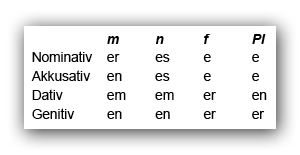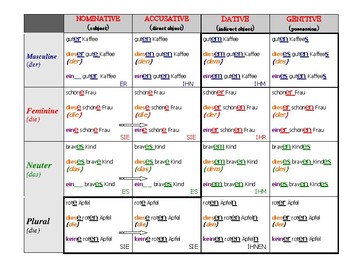

The same is true for pronouns such as dergleichen, derlei, dessen/deren, wessen, undeclined indicators of quantity such as ein wenig, ein paar and declined indicators of quantity only used in the plural such as viele, wenige, einige. When you encounter the combination of adjective + noun without any article, you use the strong declension. The strong declension of German adjectives without articles The mixed declension is called mixed because the adjectives in most cases take weak endings, while they take strong endings in the singular nominative masculine and neuter, and the singular accusative neuter. The negation article kein asks for the mixed declension as well. Possessive articles are mein, dein, sein/ihr/sein, unser, euer, ihr. The indefinite article is einer, eine, eines. When you encounter the combination of indefinite or possessive article + adjective + noun, you use the mixed declension.

The mixed declension of German adjectives with indefinite and possessive articles The adjective itself is declined with weak endings. This type of declension is called weak because the case marker is carried by one of these particles and not the adjective. Don’t forget that these have to agree with the noun, too. Other words that call for the weak declension are the pronouns dieser, jener, derselbe, welche, solcher and declined indicators of quantity such as jeder, mancher, alle. When you encounter the combination of definite article + adjective + noun, you use the weak declension. The weak declension of German adjectives with definite articles You will find example sentences for each declension in the table further down in this article. The three types of adjective declension are: Which one is the right one depends on the article that accompanies the noun (or doesn’t). To make things worse, there are three types of adapting German adjective endings to a noun and its different forms according to number and case.
ADJECTIVE ENDINGS GERMAN HOW TO
To ensure this, you need to determine the gender, number and case of this noun and then look at the article to find out how to correctly adapt the German adjective endings. Only when used as an attribute specifying a noun, the adjective needs to agree with this noun. There are three functions of adjectives in German: predicative, adverbial and attributive. Adjective declension is when we make an adjective agree with its noun in gender, number and case by changing its ending.


 0 kommentar(er)
0 kommentar(er)
